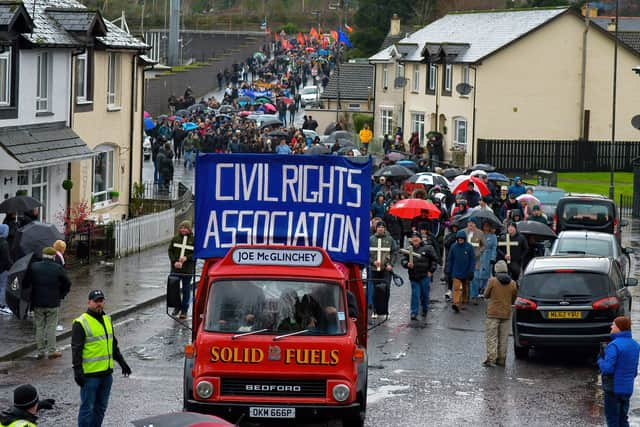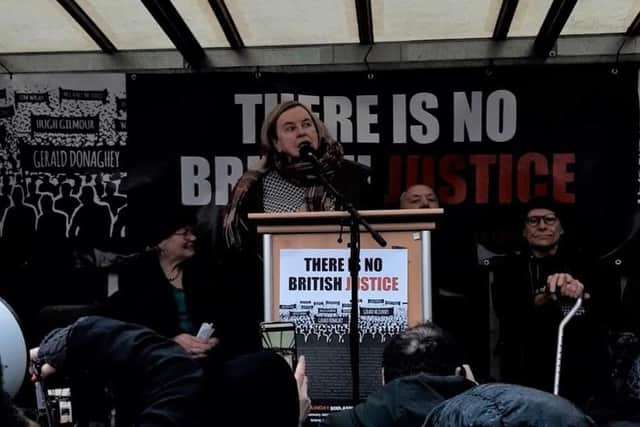Bloody Sunday 50: Bernadette McAliskey gets a chance to finish Bloody Sunday speech 50 years on
and live on Freeview channel 276
Addressing a massive attendance that had turned out for the Bloody Sunday March Committee anniversary march, she vowed that ‘Bloody Sunday will never be forgotten’.
“I’d like to say to everybody who has turned out today - thank you very much. This has to be one of the biggest crowds, after 50 years, that have attended this march which has gone on every year,” she observed after the commemoration reached Free Derry corner.
Advertisement
Hide AdAdvertisement
Hide Ad“I see young people here. I’m so glad to see so many young female faces here. There is one thing that is certain - that Bloody Sunday will never be forgotten and that the lessons learned from Bloody Sunday will never be forgotten.”


As the demonstration moved down Linsfort Drive with the civil rights anthem ‘We Shall Overcome’ playing from a loud speaker, the ‘Journal’ watched as it took fully twenty minutes to pass by. As it snaked its way through Creggan and the Bogside people lined the streets and fell in, swelling the numbers further.
Relatives of those killed and injured carried white crosses in memory of the dead and paused for moments at several points on the route, most poignantly at the Bloody Sunday memorial on Rossville Street close to where several of the 14 victims were murdered.
When finally the parade arrived at Free Derry corner Kate Nash, whose brother William was killed and whose father Alex was seriously injured on Bloody Sunday, said: “I’m delighted to say there are thousands and thousands of people here. I’m so happy about that. I was crying. It’s very, very sad that it is the 50th anniversary of Bloody Sunday and still no justice but we are still fighting and fighting very hard to get that for the families.”


Advertisement
Hide AdAdvertisement
Hide AdMs. Nash told the rally that she and others have no intention of stopping their fight.
“The fact that the British government are looking to put legislation through to give amnesties to State perpetrators, of the Bloody Sunday victims, the Ballymurphy victims and everybody else who died here, means innocent people will get no justice. I can tell you we are going to be here for a long time to come if God spares me. We will be here and we will continue to fight this and it won’t stop. We’ll never give up.”
Vincent Doherty led the crowd in a moving rendition of ‘We Shall Overcome’. Damien ‘Bubbles’ Donaghey, who was only 15 when he was the first person shot alongside John Johnston who later died, read out the names of the victims.
Advertisement
Hide AdAdvertisement
Hide AdThe crowd learned how the ashes of the recently deceased Betty Walker - a sister of Michael McDaid who was aged 20 when he was shot dead at the rubble barricade on Rossville Street - had been scattered on her request that morning at Grianán of Aileach by Geraldine Doherty, the niece of another victim, Gerald Donaghey, aged 17.
Delivering one of the main orations Bernadette McAliskey painfully recalled the minutes and hours after she was forced to interrupt her speech on the day of Bloody Sunday.
“I remember Nell McCafferty’s house. I was an MP so I was pulling a bit of rank on the phone and saying - for all the value that it was - that I’m a public representative and I demand to know [the names of the casualties].
“I’d been ringing the morgue at the hospital and people were saying that three or four people had definitely been shot. I remember at that time saying, ‘I need to know. Families need to be made aware. You can’t just be sending people to go to the morgue and them not knowing what to expect’. The person on the other end of the phone started to read out names and I started to write them down - one, two, three. I’ll never forget it. Four, five...and he kept going.
Advertisement
Hide AdAdvertisement
Hide Ad“I didn’t get to thirteen but I got to seven or eight just writing them down and everybody crammed into Nell’s mother’s hall and standing out around the door in total shock.
“I was afraid to say the names out loud because I didn’t know if any of the people standing there belonged to the people whose names were being written down.
“I don’t know how any of us kept our head at that time.”
Speaking with a black flag billowing above Free Derry corner behind her, she said: “Bloody Sunday wasn’t just about the people who were killed. It wasn’t just about this city and it wasn’t just the first of many, many heartbreaking, multiple deaths and killings that broke our hearts over 50 years.
Advertisement
Hide AdAdvertisement
Hide Ad“This was different. This was a day on which nobody went berserk. Nobody lost the run of themselves in the British army. This was the day when the change of British government policy, which had started weeks, if not months, before came to fruition on these streets.
“Internment had been introduced to try and break the people. They had responded with more marches.”
Eamonn McCann, taking to the podium, said he had been fearful of a poor turnout given the horrendous weather conditions. He said he was amazed at how many people had taken part.
“The end result is that we are all here. We kept right on till the end of the road and we will, in relation to Bloody Sunday, and the other roads that we have to travel.”
Advertisement
Hide AdAdvertisement
Hide AdHe also turned his thoughts and recollections back to that day of mass murder in 1972.
“It’s normal and natural on an occasion like this for people to remember where they were and what they were doing at the beginning of the Bloody Sunday shooting.
“One thing I can remember is that just as you heard the crack-crack of the rifles for the first time from the bottom of the street, there was a platform here - right here where we are speaking now - and Bernadette was on the platform too. I was walking from where the high flats used to be over towards here - about 50 yards from where I am now. I heard Bernadette beginning to speak. She was to be the first speaker. I heard that soprano Tyrone accent, that sing-song voice, beginning to speak. People began to hurry to reach the platform and she was interrupted by the bullets of the Parachute Regiment.
“I’m delighted that I’ve been around for long enough to hear her come back and finish her speech 50 years later.”
Advertisement
Hide AdAdvertisement
Hide AdMr. McCann spoke of the huge impact the massacre has had on Derry. But he also placed it in its national and international context.
“What happened on Bloody Sunday was a Derry event. It has defined Derry over the subsequent years. All the major political disputes and splits in Derry have really reflected attitudes and reactions to Bloody Sunday but it is not just a Derry event.
“It is also an Irish event in the trajectory of history and Irish politics and Irish struggle down through the years and the massacres and atrocities visited upon Irish people that stood up for themselves and stood up for future generations as they looked forward. Bloody Sunday represents all that.
Advertisement
Hide AdAdvertisement
Hide Ad“The Black and Tans were born again on this piece of land in front of us now. But it was also more than that. Bloody Sunday was a world event. Bloody Sunday was a microcosm of what was happening then and still happens often today but was happening in the wide world.”
Clare Daly, the Dublin MEP, who sits with the European United Left/Nordic Green Left (GUE/NGL), in Brussels and Strasbourg, was the final speaker.
“It’s never easy to be in Derry on this day...because we have to walk in the footsteps of those who went before us in ‘72, to shoulder the memory of innocent lives cruelly taken, to reimagine the fear, the panic, the horror as those events unfolded. And how much harder is it to be here today fifty years on? Fifty years of missed birthdays and Christmases. Fifty years of lost opportunities to love and live and work and play. Fifty years of injustice. Yes we are here to remember but the truth is we never forgot.”
